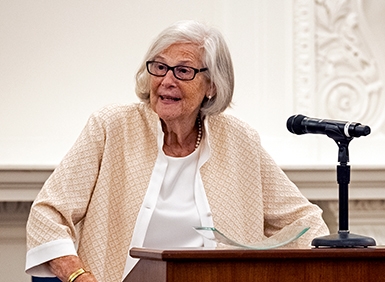Annual Survey of American Law honors Sally Katzen for leadership on administrative law and regulatory review
At a September 23 ceremony, the 81st volume of the NYU Annual Survey of American Law was dedicated to Sally Katzen, professor of practice and distinguished scholar in residence. Katzen “is both the George Washington and the den mother of the agency I now have the honor to lead,” said Dean Emeritus Richard Revesz, currently on leave to serve as the administrator of the Office of Management and Budget’s (OMB) Office of Information and Regulatory Affairs (OIRA). The Annual Survey, a student-run journal, honors an individual every year for their outstanding contribution to American law.
While the juxtaposition Revesz offered may have been unexpected, Katzen has assumed an array of important roles inside and outside government over the past half-century. The first woman to be editor-in-chief of the Michigan Law Review, Katzen went on to become a partner at Wilmer, Cutler & Pickering and to serve in the Executive Office of the President during the Carter administration. Following her stint at OIRA, Katzen was deputy assistant to the president for economic policy and deputy director of the National Economic Council, and then OMB’s deputy director for management.
As head of OIRA during the Clinton administration, Revesz explained, Katzen redefined an agency created during the Reagan administration to decrease regulation. OIRA reviews economically significant draft rules from federal agencies and guides the implementation of various policies across the federal government. Katzen worked to cultivate a bipartisan consensus that centralized review helps prevent agencies from working at cross purposes while allowing the government to understand the consequences of significant actions.
“Sally’s deft work in her recasting of OIRA’s role away from its anti-regulatory origins and into a durable institution that promotes rationality in regulatory actions is what makes her the George Washington of the agency,” said Revesz.
Since stepping down as OIRA administrator in 1998, Katzen has mentored many OIRA career officials and political appointees, Revesz added. In other words, he said, she remains OIRA’s den mother, “[caring] deeply, not only about the lofty principles that guide the executive branch, but also about the dedicated individuals who carry out its work.”
In 2010, Revesz persuaded Katzen to join NYU Law, where she now teaches the Advanced Administrative Law Seminar and co-directs the Legislative and Regulatory Process Clinic in Washington, DC. Professor of Practice and Distinguished Scholar in Residence Bob Bauer, former White House counsel, described an early encounter with Katzen not long after his arrival at the Law School: “[She] ambushed me, and in a matter of minutes—just minutes!—had drafted me to be co-director with her of the Legislative and Regulatory Process Clinic.”
That persuasive persistence, Bauer said, is of great value to their students, who work in legal externships as part of the clinic—sometimes at federal agencies that have never accepted externs from other institutions. The agencies, Bauer explained, “give in after Sally has conducted a monthlong siege with multiple emails and the exercise of considerable charm in multiple phone calls.”
Bauer also praised Katzen’s skills as a lawyer, emphasizing her professional integrity and her ability to demonstrate those values to students. She has no hesitation about thoroughly critiquing their work, he said, “but like any fine teacher, she uses the occasion to express confidence that if they work hard enough, if they care enough, they will meet her expectations and build expectations of their own for themselves.”
One of those former students, who also served as Katzen’s research and teaching assistant, is Rachel Rothschild ’20, now an assistant professor of law at the University of Michigan Law School. In her remarks, she credited Katzen with helping her develop as an instructor: “I owe it to Sally for showing me how to create a classroom environment where students feel respected and where we can have difficult conversations about some of the most important legal questions we face today.”
On a more personal note, Rothschild recalled Katzen’s kindness. As the only woman in her class year with a child, Rothschild said, she wondered whether she was up to the workload, but a pep talk from Katzen “gave me the push I needed to throw myself back into law school.” In the early days of the COVID-19 pandemic, as Rothschild was dealing with a difficult pregnancy, Katzen checked in about her mentee’s welfare frequently, even as Katzen herself fell ill.
“I could not have managed those early pandemic months without her support,” said Rothschild, “and her selflessness and concern for me is something I will never forget.”
Finally, it was Katzen’s turn to speak. “In just the last few years, the Supreme Court has been ‘greatly troubled’ by the growth of the administrative state,” she said, “and it has increasingly questioned the legitimacy of, and then started cutting back on the ability of the agencies to function effectively.”
Katzen’s critiquing skills came to the fore as she discussed several recent Supreme Court rulings related to her field of expertise, lamenting the unraveling on both sides of the aisle of belief in regulation. “I remain at heart somewhat optimistic,” she said. “I don’t know why or how, but I am determined to help bring civility and constructive engagement to the fore. So I continue to testify before Congress, to speak to the press and other audiences on these issues, and to teach.”
On that last point, Katzen had something to add. “I get to rethink, recalibrate, and sometimes even outright change my views,” she said. “I trust my students have gotten a lot from me. I hope they know that I have learned a lot from them.”
Posted October 14, 2024


